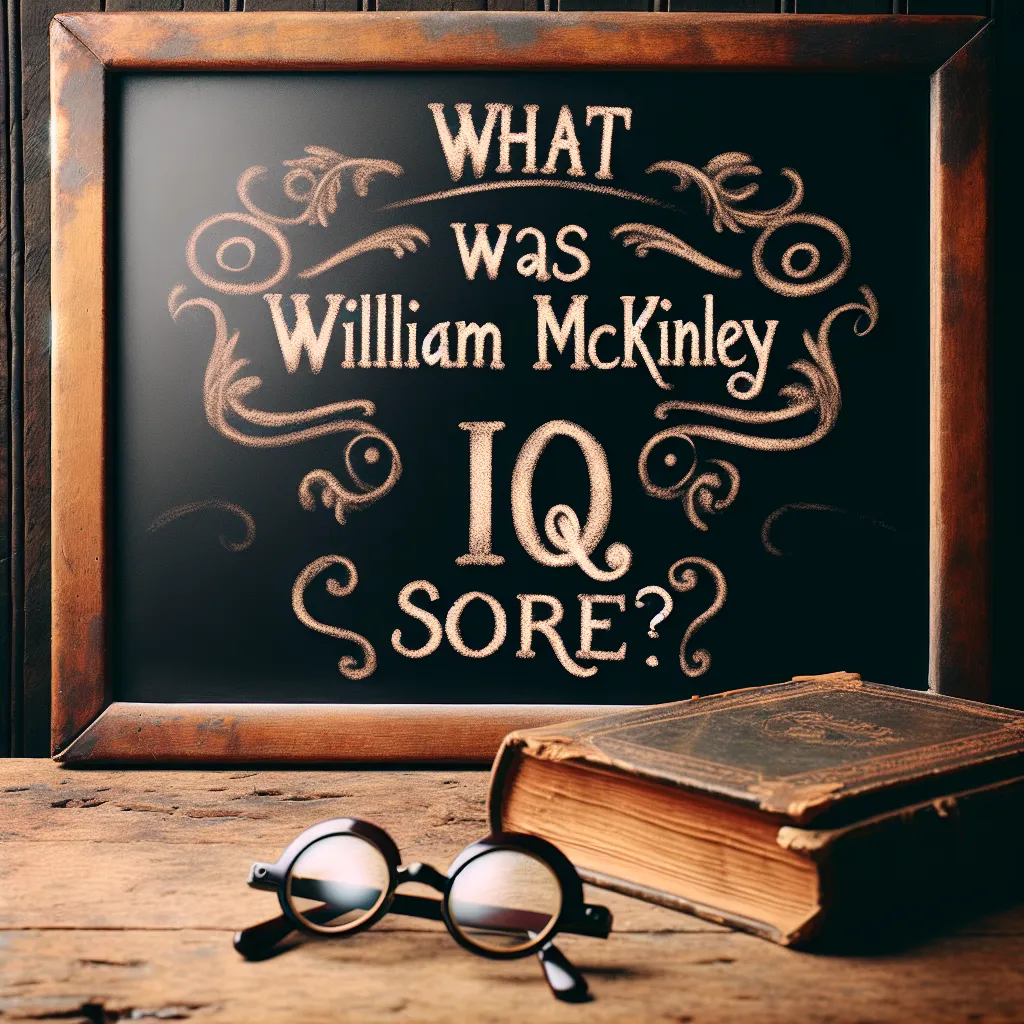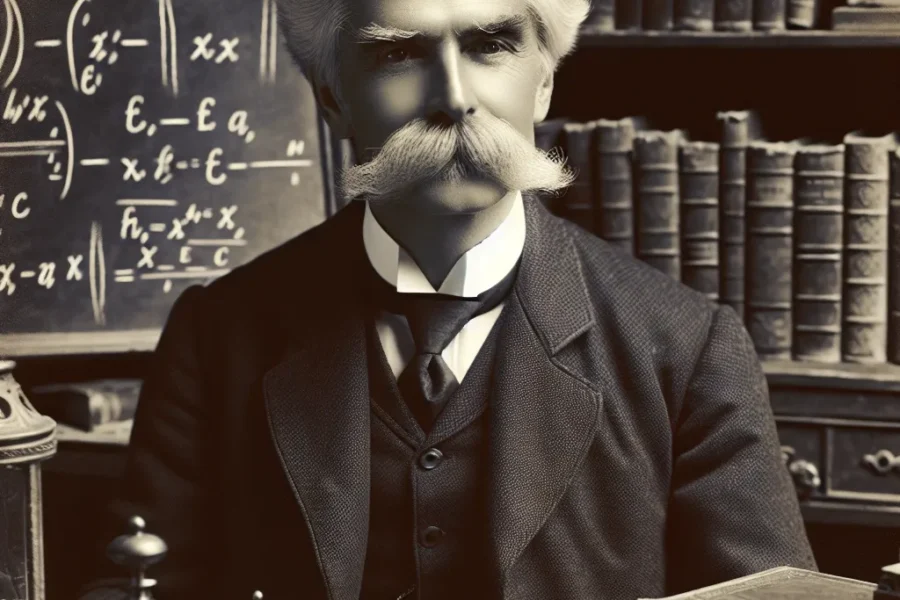William McKinley, the 25th President of the United States, holds a significant place in American history. Born on January 29, 1843, in Niles, Ohio, and tragically assassinated in 1901, McKinley led the nation during a transformative period marked by industrialization, territorial expansion, and the Spanish-American War. Despite his pivotal role during this time, one question that often piques the curiosity of historians and casual learners alike is: What was William McKinley’s IQ score?
If you are looking for legitimate IQ Tests which pass the entry bar for Mensa, see our IQ Tests.
Determining the IQ of historical figures can be a challenging endeavor, especially when they lived in an era before standardized intelligence tests were developed. The concept of IQ, or Intelligence Quotient, emerged in the early 20th century with the work of psychologists such as Alfred Binet and Lewis Terman. These pioneers in psychological measurement developed tools to assess cognitive abilities, but these tests were not available during McKinley’s lifetime. Consequently, any claims about McKinley’s IQ score are speculative at best.
However, we can glean some insight into McKinley’s intellectual capabilities through his life achievements, educational background, and leadership qualities. These factors, while not direct measurements of IQ, provide valuable context for understanding his cognitive prowess.
William McKinley’s early life and education laid the foundation for his intellectual development. Raised in a devout Methodist family, McKinley was instilled with a strong sense of duty and ethics from an early age. He attended a series of public schools in Ohio before enrolling at Allegheny College in Meadville, Pennsylvania. Although McKinley did not complete his studies at Allegheny due to health and financial issues, his time there exposed him to a rigorous academic environment that likely honed his intellectual abilities.
Another significant aspect of McKinley’s early education was his time at the Union Army during the American Civil War. Enlisting as a private and rising to the rank of brevet major by the end of the war, McKinley demonstrated leadership, strategic thinking, and decision-making skills. These attributes are often correlated with higher cognitive abilities, suggesting that McKinley possessed above-average intelligence.
Following his military service, McKinley pursued a career in law. He studied at Albany Law School, where he undertook rigorous legal training. The practice of law requires analytical thinking, problem-solving skills, and a deep understanding of complex legal principles. McKinley’s success as an attorney, eventually becoming a prominent figure in the Ohio legal community, further underscores his intellectual capabilities.
McKinley’s entry into politics marked the beginning of a distinguished career that would eventually lead him to the highest office in the land. Elected to the House of Representatives in 1876, McKinley served multiple terms and earned a reputation as a skilled orator and policy expert. His ability to navigate the intricacies of legislative processes, build consensus among his peers, and articulate his vision for the nation are all indicative of a sharp and strategic mind.
As President, McKinley’s leadership during the Spanish-American War demonstrated his aptitude for managing complex international conflicts and making critical decisions under pressure. The successful outcomes of this conflict, including the Treaty of Paris and the acquisition of territories such as Puerto Rico, Guam, and the Philippines, are testaments to his effective governance and strategic foresight.
While these accomplishments paint a picture of McKinley as a capable and intelligent leader, it is important to note that assigning an exact IQ score to a historical figure based on biographical information and achievements is inherently speculative. IQ tests are designed to measure specific cognitive abilities through standardized assessments, and without such a test administered during McKinley’s lifetime, any purported IQ score remains conjecture.
Moreover, the concept of intelligence itself is multifaceted and complex. Modern psychologists recognize that intelligence encompasses a wide range of cognitive abilities, including linguistic, mathematical, spatial, interpersonal, and intrapersonal intelligences, among others. McKinley’s skills in eloquence, law, leadership, and strategic planning suggest he possessed strengths in several of these areas.
It is also worth considering that historical context plays a significant role in shaping our understanding of McKinley’s intelligence. The era in which he lived, characterized by rapid technological advancements and changing geopolitical dynamics, demanded a different set of skills and knowledge than what might be emphasized today. McKinley’s ability to adapt to these changes, stay informed about global developments, and effectively lead the nation during such transformative times speaks to his intellectual adaptability and vision.
To further explore McKinley’s intellectual legacy, it is valuable to consider the perspectives of his contemporaries and historians. Accounts from individuals who knew and worked with McKinley often highlight his intelligence, integrity, and dedication to public service. Historians studying his administration have noted his pragmatic and methodical approach to governance, as well as his ability to build effective coalitions and implement significant policy changes.
One notable example of McKinley’s policy achievements is the passage of the Dingley Tariff Act of 1897. Named after Congressman Nelson Dingley Jr., this legislation aimed to protect American industries by imposing high tariffs on imported goods. The Dingley Tariff Act was a cornerstone of McKinley’s economic policy, and its successful implementation required not only economic acumen but also political savvy. McKinley’s ability to balance competing interests and garner support for this legislation underscores his intellectual and strategic capabilities.
Another significant aspect of McKinley’s presidency was his focus on monetary policy. The debate over the gold standard versus bimetallism was a contentious issue during his time in office. McKinley, a proponent of the gold standard, believed it would provide economic stability and confidence in the U.S. currency. His efforts to maintain the gold standard, culminating in the passage of the Gold Standard Act of 1900, demonstrated his deep understanding of economic principles and his commitment to a stable monetary system.
In addition to his economic policies, McKinley’s foreign policy decisions also reflect his intellectual acumen. The acquisition of new territories following the Spanish-American War required careful negotiation and diplomacy. McKinley’s handling of these complex international affairs, including the annexation of Hawaii and the establishment of a protectorate over Cuba, showcased his ability to navigate geopolitical challenges and make decisions with far-reaching implications.
Furthermore, McKinley’s commitment to civil service reform and administrative efficiency highlights his forward-thinking approach to governance. He recognized the importance of a merit-based civil service system and took steps to reduce political patronage and corruption in government appointments. These efforts demonstrated his understanding of the need for an effective and accountable bureaucracy to support the functioning of a modern state.
While it is impossible to assign a precise IQ score to William McKinley, the evidence from his life and career suggests that he possessed significant intellectual abilities. His achievements in law, politics, and governance, as well as his strategic thinking and decision-making skills, highlight a leader of considerable intelligence and capability.
Ultimately, when evaluating historical figures like McKinley, it is essential to consider the broader context of their contributions and the challenges they faced. Intelligence is not merely a measure of cognitive ability but also encompasses qualities such as adaptability, vision, and the capacity to effect meaningful change. William McKinley’s legacy as a transformational leader during a pivotal era in American history is a testament to his intellectual prowess and enduring impact on the nation.
In conclusion, while we may never know William McKinley’s exact IQ score, his life and accomplishments provide ample evidence of his significant intelligence and capabilities. From his early education and military service to his legal career and presidency, McKinley’s journey is marked by numerous achievements that reflect his cognitive strengths and leadership qualities. As we continue to study and understand historical figures, it is crucial to recognize the diverse dimensions of intelligence and the enduring legacy of individuals like William McKinley.



Leave a Comment